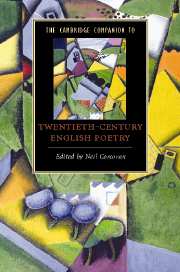3 - Postmodern poetry in Britain
from Part I - Contexts
Published online by Cambridge University Press: 28 January 2008
Summary
If the era of 'postmodernity' is increasingly seen as 'a socio-economic mode that has intensified and surpassed modernity itself' then poetry produced under this new 'socio-economic mode' might rightly be dismissed as another form of 'postmodern' candyfloss neatly packaged for our quick or therapeutic consumption. On the other hand perhaps poets, often relatively uninvested in the capital of a culture industry, which is currently terming itself in its latest guise as 'postmodern', are one of the few cultural producers left who can afford to be sceptical of the current era and of the claims of culture itself. Paradoxically, this means that poetry has the potential to be the most 'postmodern' and the most 'anti-postmodern' of the arts. Anthologies of the period reflect the unease with which contemporary poets and critics have embraced and subsequently distanced themselves from such an elastic term. Although there is some overlap between poets represented in anthologies of British poetry since 1980, what is most striking is the divergence between them that marks an important and decisive split in post-war poetry in Britain. Poets from both groupings have been termed 'postmodern'.
There are clearly a number of definitions of the 'postmodern' in operation here. The first is linked to the branding, dilution (under the guise of accessibility) and commodification of intellectual and creative activity which have become key features of the 'postmodern' era. The second relates to the formal and conceptual features of 'postmodernism' as it has developed in relation to other disciplines such as architecture and the visual arts. The editors of The New Poetry (1993) describe their selection as emphasising 'accessibillity, democracy and responsiveness, humour and seriousness'.
- Type
- Chapter
- Information
- Publisher: Cambridge University PressPrint publication year: 2007
- 5
- Cited by



